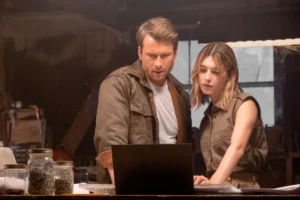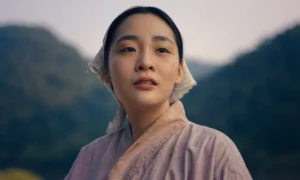According To The variety) Connecting an actor’s onscreen personality with his or her offscreen reality tends to be a dicey proposition. But in “Faye,” an addictive and essential portrait of Faye Dunaway, it turns out to be the right thing to do. Dunaway, now in her early 80s, is interviewed throughout this HBO documentary, and there’s a knowing snap to her self-reflections that grabs you. Seated on a couch in her New York apartment, she starts off by chastising someone for bringing her water in a bottle instead of a glass — a sign that the movie is going to have fun with what a diva she is. As “Faye” presents it, Dunaway was too volcanic and troubled a personality not to pour herself into her roles. That’s part of what made her great. Yet the film also wants to cue us to the gossipy and reductive way that this kind of thinking has too often been applied to her. Dunaway, by her own admission, was demanding, perfectionistic, and nothing short of obsessive in the pursuit of acting — in other words, she was “difficult” because she possessed many of the qualities that male actors have been celebrated for, and are certainly more easily forgiven for. In “Faye,” we see a clip of the ancient Bette Davis on “The Tonight Show,” asked to name the star she’d least want to work with again. She blurts out Dunaway’s name, then says that everyone in Hollywood would say the same thing. Talk about projection! But the talk-show audience has quite a chortleYet the first thing to say in response to that is how suspect we should all be of the D-word, especially as applied to women. Yes, Dunaway was difficult; the documentary acknowledges her struggles with bipolar disorder and alcoholism. In her case, however, there’s something fundamentally unfair about the way that her offscreen reputation, viewed through the lens of her characters, became nearly mythological.
At her peak, Dunaway was one of the great Hollywood stars, but because she gave such an infamously flamboyant (and unjustly ridiculed) performance as the raging Joan Crawford of “Mommie Dearest,” a movie that became known as a “disaster” (though it wasn’t), and because the won the Oscar for playing a television executive in “Network” who was, at the time, unprecedented for a female character in her high-strung fixation on power and success, a lot of people — in fact, the entire culture — put those two performances together with Dunaway’s “difficult” reputation and said, “Aha! That’s who Faye Dunaway really is.”
Her acting in “Network” is stupendous, and “Faye” goes into how the performance was criticized by feminists, because it made this power-broker shark into such a dark and unforgivable character. But then we see a clip of Dunaway defending the performance as an expression of feminism — because, she explains, if we’re going to have women in new kinds of roles (in movies and in the society), then we have to get past pretending that they always need to be admirable; that’s its own kind of sexist pedestal. What Dunaway did in “Network” is closer to what De Niro and Pacino were doing in “Mean Streets” and “Dog Day Afternoon” — she was letting the audience live inside the character’s outsize flawed humanity. And while Dunaway calls “Mommie Dearest” a “mistake,” Mara Hobel, the actress who played the young Christina Crawford, says, “I feel like ‘Mommie Dearest’ was released 40 years too early.” She’s right. The film’s camp flamboyance was always fun (that’s why people have never stopped talking about it), yet it was punished for falling between the cracks of being a serious movie and a conscious piece of trash.
“Faye,” directed by Laurent Bouzereau, is one of those story-of-a-star documentaries that makes me appreciate the no-frills precision of the HBO school of celebrity portraiture. In a brisk 90 minutes, the film covers Dunaway’s small-town Texas roots, her family demons, her revolutionary film career, her passion for the stage, her romantic relationships, and how her reputation for being “difficult” was in some ways earned…and the product of a collision between a less enlightened time and a radically forward-thinking actress.
As a kid, I was possessed by Dunaway in “Bonnie and Clyde.” Her beauty in that movie was unique, because even though you can describe it in terms of her features (the cheekbones, the elegant eyes, the smile with its radiant jut of upper front teeth), the beauty was never static; it was always in motion. And so were her emotions. I’d never seen an actress who was so soft and sensual but who also projected the kind of anger that Dunaway did. That anger was defining (as in the scene, shown in the documentary, where Bonnie shouts at Clyde, “The only thing special about you is your peculiar ideas about lovemaking, which is no lovemaking at all!”). Her anger was charged, lyrical, cathartic. It was like the anger of Barbara Stanwyck or — yes — Bette Davis made into something fearlessly expressive and modern.
“Chinatown,” in 1974, was perhaps her greatest tour de force, and though it’s widely recognized as a stellar piece of acting, one reason she isn’t given more credit for it is that the performance — luminous, silken, charged with tremulous despair — was so surrounded by greatness: Jack Nicholson’s whiplash power, as well as the film’s own mazelike evocation of political corruption and rot. But Dunaway’s Evelyn Mulwray is the film’s beating heart, and the fulcrum of its portrait of what abuse really is, and what it does (it creates ripples of destruction). The “She’s my daughter, she’s my sister” scene is extraordinary in every way (those were real slaps), but it’s Dunaway who knocks the wind out of you. This is noir taken to the level of Greek tragedy.
Dunaway was born in 1941, and in the photographs we see of her when she was growing up, or as a student at Boston University (where she studied theater), she looks like a moon-faced farm girl, as different from the star she would become as Norma Jean was from Marilyn Monroe. As a girl, Dunaway was known as Dorothy Faye, a name that, for her, now conjures a kind of alter ego — the innocent she was, and maybe still is deep down. But her acting ambition always pulled her to the fraught side of things. We see stills of her starring in a college production of “Medea.” Even then, she was drawn to making rage into something spiritual.
The film charts her move to New York, where she studied with Elia Kazan at the Lincoln Center Repertory Company, and then, after breaking into the movie business via producer Sam Spiegel, who cast her in “Hurry Sundown,” she landed “Bonnie and Clyde.” The film’s director, Arthur Penn, knew that he wanted her for Bonnie from almost the moment he saw her (she beat out Jane Fonda and Tuesday Weld, among others). And there’s a way that Dunaway dominates “Bonnie and Clyde.” As great a movie as it was, it also made her a style icon (those berets! that flat blonde hair and cocked-for-glory stare!).
We hear tales of Dunaway’s idiosyncrasies on sets, like her addiction to Blistex, which she felt she couldn’t speak properly without. Dunaway recalls that she and Roman Polanski, the director of “Chinatown,” terrorized each other, and there are good stories from her “Barfly” costar Mickey Rourke, her good friend Sharon Stone, and James Gray, who directed her in “The Yards.” And though I wish the documentary had included details of her affair with Lenny Bruce, there are more than enough stories of her tempestuous love life: her relationships with the photographer-turned-director Jerry Schatzberg and with Marcello Mastroianni; her marriage to the rock star Peter Wolf, whom she left to marry the British photographer Terry O’Neill, with whom she adopted her son, Liam, who is prominently featured in the film as a visible testament to her motherly devotion.
It was O’Neill who staged and shot the famous photograph of Dunaway lolling next to a swimming pool at the Beverly Hills Hotel the morning after her Oscar win in 1977, and it’s one of the most profound of Hollywood portraits. The look on Dunaway’s face, which the film suggests is a look of “Is that all there is?,” could only have come from an actress of daunting ambition, one who now found herself somewhere over the rainbow of stardom.
















+ There are no comments
Add yours